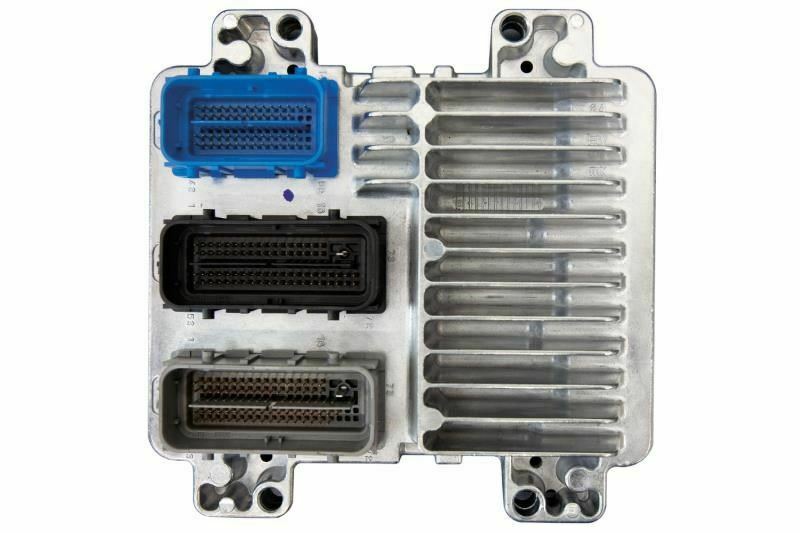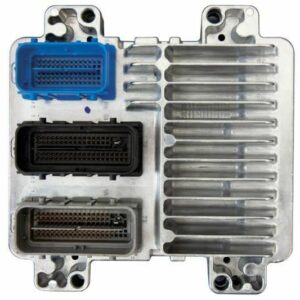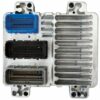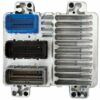Restore Peak Performance to Your Vehicle with a VIN-Programmed ECM
Is your Cadillac, Hummer, or Chevy truck plagued by frustrating issues like a persistent check engine light, rough idling, stalling, or poor fuel economy? These are classic signs of a failing Engine Control Module (ECM), the computer that serves as your vehicle’s brain. When it falters, everything from engine timing to fuel delivery can be thrown off, leaving you with an unreliable and inefficient vehicle. This isn’t just an annoyance; it’s a critical component failure that needs a reliable solution.
We offer a dependable, direct-fit replacement Engine Control Module that arrives at your door ready to install. The biggest hurdle with ECM replacement is typically the expensive and time-consuming programming required at a dealership. We eliminate that step entirely. Simply provide your vehicle’s VIN (Vehicle Identification Number) during checkout, and our technicians will program the module with the latest, most stable GM factory software specific to your car or truck. This ensures seamless communication with your vehicle’s other systems and restores its original performance and efficiency.
Is Your Vehicle Showing These Symptoms?
- ✔ Unexplained Check Engine Light (CEL) illumination
- ✔ Stalling, hesitation, or stumbling during acceleration
- ✔ Noticeable decrease in fuel mileage
- ✔ Engine misfires or rough running conditions
- ✔ Vehicle won’t start, or starts intermittently
- ✔ Diagnostic Trouble Codes (DTCs) stored, such as P0601, P0602, P0606, or U0100
Case Study: A Tricky Diagnosis
A few months back, a 2010 Cadillac DTS with the 4.6L Northstar engine came into my bay. The owner was frustrated with an intermittent, heat-related issue. The car ran perfectly fine when cold, but after 20-30 minutes of driving, it would develop a random misfire and sometimes stall at stoplights. No consistent codes were being stored, making it a diagnostic nightmare. After checking all the usual suspects—plugs, coils, fuel pressure—we focused on the ECM. On a hunch, we used a heat gun to carefully warm the module while the engine was running. Sure enough, as the ECM’s internal temperature rose, the engine began to stumble. The internal circuits were failing under thermal stress. We replaced it with a VIN-programmed module like this one, and the car has run flawlessly ever since. It’s a textbook example of how these modules can fail in ways that are hard to pinpoint without experience.
A Straightforward Guide to Installation
Replacing your 2009-2010 STS Engine Control Module is a manageable task for a DIYer with basic tools. Our pre-programming service handles the most complex part for you. Follow these general steps for a successful installation.
- Safety First: Disconnect the negative terminal from your vehicle’s battery and secure it away from the post to prevent any accidental reconnection.
- Locate the ECM: On the Cadillac STS, the ECM is typically located on the driver’s side frame rail. For other models, it may be on the firewall or in the engine compartment (refer to the fitment list for location hints).
- Disconnect and Remove: Carefully unplug the electrical connectors from the old module. There are usually release tabs that need to be pressed. Once disconnected, unbolt the module from its mounting bracket.
- Install the New Module: Bolt the new, pre-programmed ECM into place. Reconnect the electrical connectors, ensuring they click securely into position.
- Reconnect Battery: Reattach the negative battery terminal.
- Perform Security Relearn: Your vehicle’s anti-theft system will likely need to be relearned to the new ECM. This procedure is simple and requires no special tools. Typically, it involves turning the key to the ‘ON’ position for 10-15 minutes, then ‘OFF’, and repeating this cycle three times before starting the engine. Consult your owner’s manual for the exact procedure for your model.
Will This Fit My Vehicle?
This ECM is a direct replacement for a wide range of GM vehicles and is interchangeable with multiple service numbers, including 12636659, 12639300, 12628993, and more. Please verify your model and options below:
- Cadillac CTS (2009): 6.2L, (RH front engine compartment)
- Cadillac DTS (2009-2011): Electronic Control Module
- Cadillac SRX (2009): 4.6L, (LH engine compartment)
- Cadillac STS (2009): 4.4L or 4.6L, (LH frame rail)
- Cadillac STS (2010): 4.6L, (LH frame rail)
- Cadillac XLR (2009): ID 12636659 or 12625453, (RH front engine compartment)
- Chevrolet Colorado (2009-2012): 2.9L or 3.7L, (RH firewall)
- Chevrolet Corvette (2009): ZR1, (RH engine compartment)
- Chevrolet Trailblazer (2009): 6.0L, (LH engine)
- GMC Canyon (2009-2012): 2.9L or 3.7L, (RH firewall)
- GMC Envoy (2009): 5.3L, (LH engine)
- Hummer H3 (2009-2010): 3.7L, (RH firewall)
- Buick Lucerne (2009-2011): 4.6L, (lower part of air cleaner box)
- Saab 9-7X (2009): (LH engine)
Frequently Asked Questions
Do I need to do any programming myself?
No. We handle all the programming before shipment. Just provide your VIN when you order, and the module will arrive with the correct GM software for your vehicle, ready for installation.
What is the security relearn procedure?
This is a simple process that syncs the new ECM with your vehicle’s anti-theft system. It typically involves cycling the ignition key and waiting for a set period. It requires no special tools and instructions can be found in your owner’s manual or online.
How do I find my VIN?
Your 17-digit Vehicle Identification Number (VIN) can be found on your vehicle’s registration, insurance card, or on a plate on the driver’s side of the dashboard, visible through the windshield.
Is this part a guaranteed fit for my 2009-2010 STS Engine Control Module?
Yes, this module is a confirmed fit for the 2009-2010 Cadillac STS. It also fits a wide variety of other GM models as listed in the compatibility section. Providing your VIN ensures we program it perfectly for your specific vehicle options.
My original part number is different. Will this still work?
Yes, this ECM is a direct replacement for several service numbers, including 12636659, 12639300, 12628993, and others listed. As long as your vehicle is on the compatibility list, this module will function correctly.



